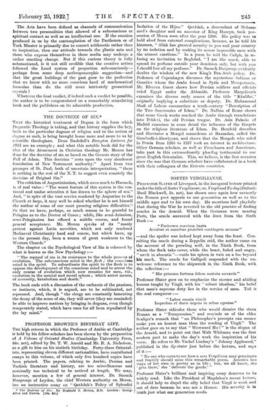SORTES VERGILIANAE.
PROFESSOR SLATER of Liverpool, in the inaugural lecture printed under the title of Series V ergilianae ; or, V ergil and To-day (Oxford: Basil Blackwell, 2s. net), has shown once again how earnestly the Roman poet appeals to our generation as well as to the middle ages and to his own day. He mentions half playfully that during the War he reverted to the old practice of finding oracles in the Aeneid. When the Germans were nearing Paris, the oracle answered with the lines from the Sixth Book :— " Furiarum maxima iuxta
Accubat et rnanibus prohibet eontingere Me11138,3"
—and the spoiler was indeed kept away from the feast. Con- sulting the oracle during a Zeppelin raid, the author came on the account of the prowling wolf, in the Ninth Book, from whom the flock take cover, while the beast, foiled and angry. " anvit in absentia "—voids his spleen in vain on a foe beyond his reach_ The oracle for Gallipoli responded with the un- welcome reference to the shipwreck in the Ninth Book, with the reflection :— " Hie primum fortune fidem mutate. novavit."
Professor Slater goes on to emphasize the sterner and abiding lessons taught by Virgil, with his "robust idealism," his belief that man's supreme duty lies in the service of man. Toil is the real conqueror :— "Labor omnia vincit Improbus et dune urgens in rebus °goatee."
Professor Slater ridicules those who would dismiss the stern Roman as a " Tennysonian," and reminds us of the elder Scaliger's remark that "no Philosopher's precepts can sooner make you an honest man than the reading of Virgil." The author goes on to say that "Westward Ho I" is the slogan of the Aeneid, and to point out that Walt Whitman was the first modern poet to make the day's work the inspiration of his verse. He refers to Mr. Vachel Lindsay's "Johnny Appleseed," published in the Spzetator just before the lecture, and says of it :—
"No one who cares to see how a sera Vergitiana may germinate and fructify should miss this remarkable poem. America has ways of her own in poetry as in life-; but, we all know, she 'gets there,' she 'delivers the goods.'"
Professor Slater's brilliant and inspiring essay deserves to be widely read. Like the President of Magdalen's recent lecture, it should help to dispel the silly belief that Virgil is weak and out of date because he was not a Homer. His severity is hi truth just what our generation needs.


































 Previous page
Previous page